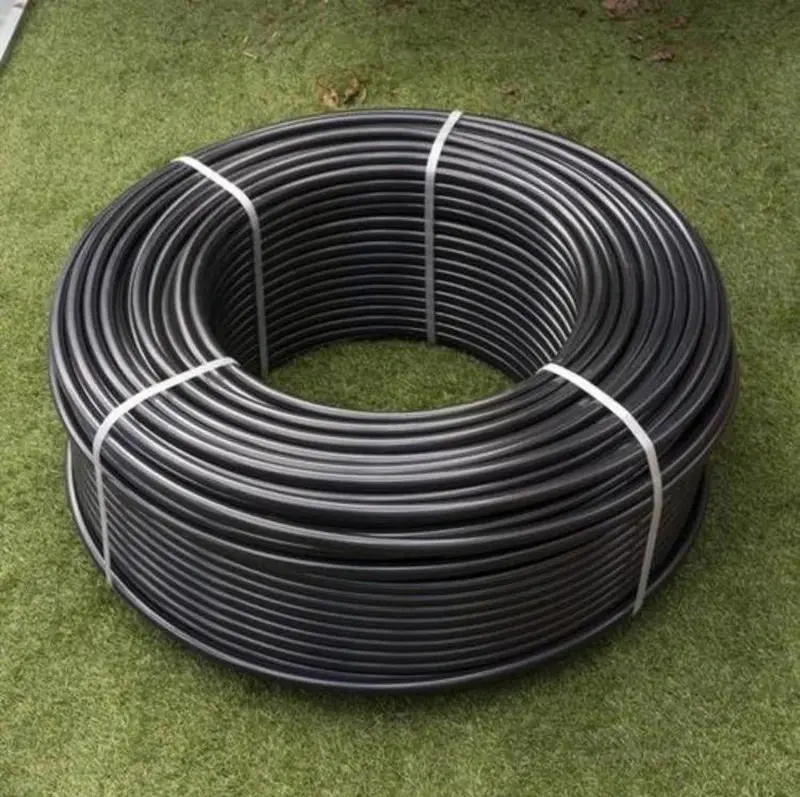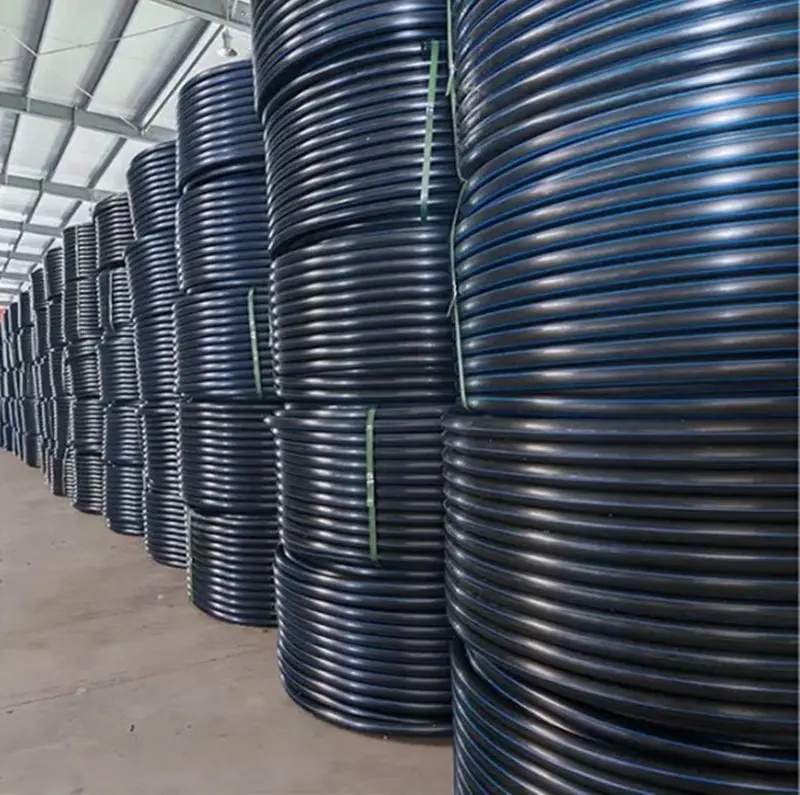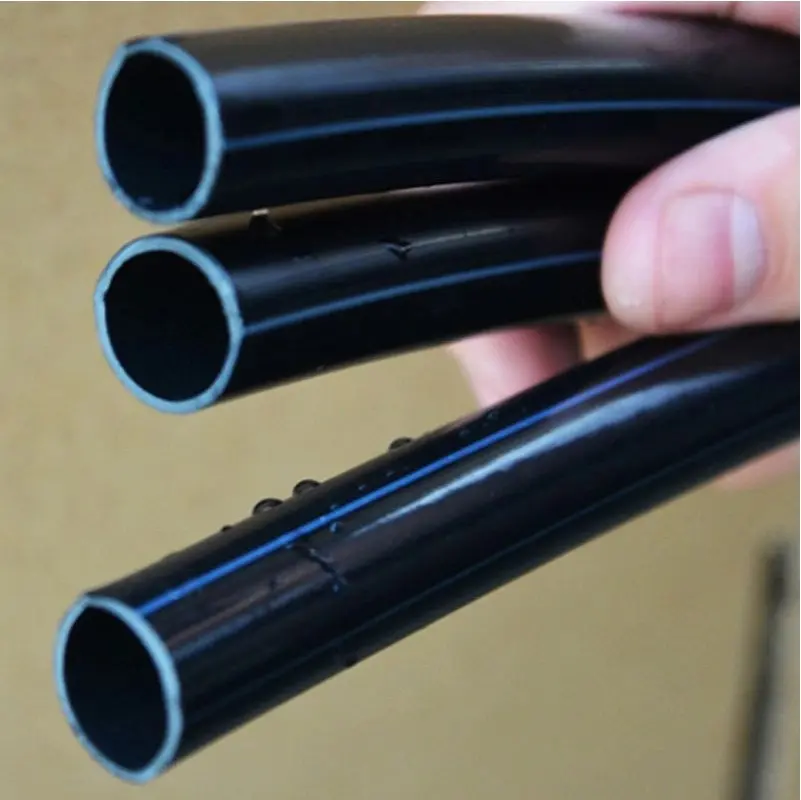1.How to Choose the Right Agricultural Irrigation Pipe
Irrigation is an essential part of modern agriculture and animal husbandry. It allows farmers to nourish the land even in the driest regions, helps produce healthier and more abundant crops, and reduces water waste.
However, the effectiveness of any type of agricultural water supply system - whether it is drip irrigation or trickle irrigation, center pivot sprinklers or fixed sprinklers - depends on the network of agricultural irrigation pipes used.
Pipes are the hydraulic backbone of every irrigation system. Therefore, it is important to understand the types of agricultural irrigation pipes commonly used in today's agricultural practices and what factors to consider when choosing the pipe that best suits your needs.

2.Main Types of Agricultural Irrigation Pipes
There are two main types of agricultural irrigation pipes on the market today; the main difference between them is the materials they are made of and the characteristics they each possess. Here is a brief overview of them:
2.1. PVC Pipes
Polyvinyl chloride or PVC pipes are one of the most popular choices for agricultural irrigation. The PVC pipe manufacturing process involves the combination of chlorine and ethylene, which results in a hard white or light-colored plastic with the following characteristics:
2.1.1Smooth surface facilitates high-pressure water flow and minimizes the risk of clogging and friction losses
2.1.2Lightweight
2.1.3Flexible, easily bypasses obstacles and passes through tight spaces
2.1.4Customizable and can be cut to size, which is particularly useful for custom irrigation systems
2.1.5Extremely durable and lasts up to 100 years
2.1.6Resistant to abrasion, corrosion, chemical buildup, and biological growth (such as algae, bacteria, and fungi)
2.1.7UV-resistant, weatherproof, and can be buried directly in the soil or used above ground without any protective measures
In addition, PVC is generally more affordable than many other types of agricultural irrigation pipes. For all of these reasons, it remains the preferred choice of countless farmers and ranchers around the world.
2.2HDPE Pipes
High-density polyethylene or HDPE pipes are another preferred material for irrigation pipe systems. They have all of the same above-mentioned characteristics as PVC, but in some ways HDPE pipes are superior.
For example, while PVC has long been praised for its durability, far outlasting cast iron, ductile iron, steel, concrete, and asbestos cement pipes, it still doesn’t hold a candle to HDPE in terms of strength.
You might also think that tough construction means rigidity, but when it comes to ductility, HDPE pipes still win out. They are more flexible and have a tighter bend radius, which makes them easier to install and requires fewer fittings.
Also, HDPE is more resistant than PVC when it comes to environmental factors like rain, wind, cold, and heat. HDPE has a failure rate of one in 10,000,000 events, while PVC has a failure rate of one in 48,650 events.
Although slightly more expensive than PVC, HDPE’s superior performance makes it a worthwhile investment in the field of agricultural irrigation pipes, especially for larger farms and large rural areas.
3.What to look out for with agricultural irrigation pipes
Whether you’re upgrading an existing water system or installing a new one, keep in mind a few key factors when weighing your agricultural irrigation pipe options:
3.1 Water pressure
A pipe’s pressure rating is the maximum water pressure (in pounds per square inch, psi) that the pipe can withstand before it breaks. This is determined primarily by the material the pipe is made of (sometimes the same type of pipe can have different materials) as well as other specifications like wall thickness and diameter. For example, if you’re choosing PVC pipe, you can choose between a No. 40 pipe with a pressure rating of 450 psi and a No. 80 pipe with a higher pressure rating of 630 psi. For underground installations, you must also remember to choose pipes with a higher pressure rating to withstand the weight of the soil and external factors (like rocks and tree roots) that may stress them.
3.2 Resistance to environmental factors
Whether above or below ground, UV rays, temperature fluctuations, soil composition, chemical content in the water, animal activity, and even unexpected events like earthquakes can affect the life of irrigation pipes (if they weren’t built for it). Consider the climate and terrain that the agricultural irrigation pipes will be continuously exposed to or belong to, and find the best materials for the job.
3.3 Flexibility
How do you plan to install the pipes? How many degrees do they need to bend? Are there obstacles that need to be avoided or incorporated into the layout? Different crops and farming methods may require unique pipe configurations.
As mentioned above, PVC is more rigid, so it almost always requires straight grooves and more fittings to make turns, while HDPE has stronger bending capabilities.

4. Installation and maintenance
HAOYANG's pipes and accessories are complete. You can buy all the accessories here, and our pipes allow you to go back and DIY independently. Just follow our videos.
Consider how much time and labor you are willing to invest in the project, and how much ongoing maintenance is required. This includes regular cleaning, as well as repair or replacement needs that may arise after many years.
5.Specification
To provide a price list for HDPE irrigation pipes, we need to consider the following specifications and factors:
Pipe Outer Diameter (OD)
Pressure Rating (PN)
Wall Thickness (Thickness)
Length (Length)
Common HDPE pipe specifications are as follows:
Outer Diameter: 20mm, 25mm, 32mm, 40mm, 50mm, 63mm, 75mm, 90mm, 110mm, 125mm, 140mm, 160mm, 180mm, 200mm
Pressure Rating: PN4, PN6, PN8, PN10, PN12.5, PN16
Wall Thickness: Varies based on pressure rating and outer diameter
Here is a list of common HDPE irrigation pipe specifications and a sample price list in USD for factory pricing:
Specification (Diameter) | Wall Thickness (mm) | Length (meters) | Factory Price per meter (USD) |
20 mm | 2.0 | 100 | $0.20 |
25 mm | 2.3 | 100 | $0.30 |
32 mm | 2.9 | 100 | $0.40 |
40 mm | 3.7 | 100 | $0.55 |
50 mm | 4.6 | 100 | $0.70 |
63 mm | 5.8 | 100 | $0.90 |
75 mm | 6.8 | 100 | $1.10 |
90 mm | 8.2 | 100 | $1.40 |
110 mm | 10.0 | 100 | $1.75 |
125 mm | 11.4 | 100 | $2.10 |
140 mm | 12.7 | 100 | $2.50 |
160 mm | 14.6 | 100 | $2.90 |
200 mm | 18.2 | 100 | $3.60 |
These prices are indicative and based on raw material costs, production efficiency,
Here is a list of common HDPE irrigation pipe specifications and a sample price list in USD for wholesale:
Specification (Diameter) | Wall Thickness (mm) | Length (meters) | Wholesale Price per meter (USD) |
20 mm | 2.0 | 100 | $0.25 |
25 mm | 2.3 | 100 | $0.38 |
32 mm | 2.9 | 100 | $0.50 |
40 mm | 3.7 | 100 | $0.65 |
50 mm | 4.6 | 100 | $0.85 |
63 mm | 5.8 | 100 | $1.10 |
75 mm | 6.8 | 100 | $1.35 |
90 mm | 8.2 | 100 | $1.70 |
110 mm | 10.0 | 100 | $2.10 |
125 mm | 11.4 | 100 | $2.50 |
140 mm | 12.7 | 100 | $2.95 |
160 mm | 14.6 | 100 | $3.40 |
200 mm | 18.2 | 100 | $4.25 |
These prices are indicative and may vary based on market conditions, quantity ordered, and specific supplier agreements. Wholesale prices generally include discounts for bulk purchasing, so negotiating with suppliers can yield better rates.
Here is a list of common HDPE irrigation pipe specifications and a sample price list in USD for retail:
Specification (Diameter) | Wall Thickness (mm) | Length (meters) | Price per meter (USD) |
20 mm | 2.0 | 100 | $0.30 |
25 mm | 2.3 | 100 | $0.45 |
32 mm | 2.9 | 100 | $0.60 |
40 mm | 3.7 | 100 | $0.80 |
50 mm | 4.6 | 100 | $1.00 |
63 mm | 5.8 | 100 | $1.30 |
75 mm | 6.8 | 100 | $1.60 |
90 mm | 8.2 | 100 | $2.00 |
110 mm | 10.0 | 100 | $2.50 |
125 mm | 11.4 | 100 | $3.00 |
140 mm | 12.7 | 100 | $3.50 |
160 mm | 14.6 | 100 | $4.00 |
200 mm | 18.2 | 100 | $5.00 |
Here is a summary of the HDPE irrigation pipe prices based on raw materials and market conditions. Prices can vary significantly depending on the country, local market dynamics, and fluctuations in the supply of raw materials.
Key Points:
Raw Material Costs: The cost of HDPE (High-Density Polyethylene) resin is a major factor in pricing. Fluctuations in the global oil market can affect resin prices.
Market Conditions: Prices can vary by region due to demand, transportation costs, and local market conditions.
Economies of Scale: Larger orders often result in lower prices per meter due to manufacturing efficiencies.
Supply Chain: Disruptions in the supply chain, such as shortages or logistical issues, can lead to price changes.
Quality Standards: Compliance with local and international quality standards can influence manufacturing costs and, consequently, prices.
For accurate pricing, it is essential to regularly update based on current market conditions and raw material costs.
6. Input costs
The lifespan of HDPE (High-Density Polyethylene) irrigation pipes typically ranges from 50 to 100 years, depending on various factors such as the quality of the material, installation practices, environmental conditions, and maintenance. HDPE pipes are known for their durability, resistance to corrosion, and flexibility, making them suitable for long-term use in irrigation systems.
To calculate the daily cost of using HDPE irrigation pipes, we can use the following formula:
Daily Cost=Total CostLifespan (in days) ext{Daily Cost} = frac{ ext{Total Cost}}{ ext{Lifespan (in days)}}Daily Cost=Lifespan (in days)Total Cost
Assuming an average lifespan of 75 years (which is 27,375 days), here is an example calculation:
Example Calculation
Total Cost Calculation: Let's assume we purchase 1000 meters of 50 mm diameter HDPE pipe at a factory price of $0.70 per meter.
Total Cost=1000 meters×0.70 USD/meter=700 USD
Daily Cost Calculation:Lifespan=75 years×365 days/year=27,375 days
Daily Cost=700 USD27,375 days≈0.0256 USD/day
Summary
Lifespan: Approximately 75 years (27,375 days)
Total Cost: $700 for 1000 meters of 50 mm diameter HDPE pipe
Daily Cost: Approximately $0.0256 per day
This shows that the cost of HDPE irrigation pipe is extremely low every day.
This calculation provides a rough estimate of the daily cost for a specific length and specification of HDPE irrigation pipe. Actual costs may vary based on the specific conditions and factors mentioned earlier.
Garden, pasture, agricultural irrigation pipes are a long-term investment in the success of your business. Therefore, you need to balance your budget with factors such as the quality, suitability, ease of installation, and service life of the pipes you purchase. Build a stronger irrigation system with HAOYANG
HAOAYANG ENVIROMENTAL CO.,LTD. is a plastic pipe solutions company based in Dezhou, China, with customers all over the world. HAOYANG's pipe prices are based on the best price above cost, because the scale effect allows us to achieve the best price while maintaining stable quality.
For 20 years, we have been producing PVC and HDPE pipes and fittings and pipe accessories for the agricultural, commercial and industrial fields according to the highest international standards.
To learn more about our plastic pipe products and installation services, and how we can help you build a stronger and more efficient irrigation system, please contact us today.

897.webp)
942.webp)
237.webp)